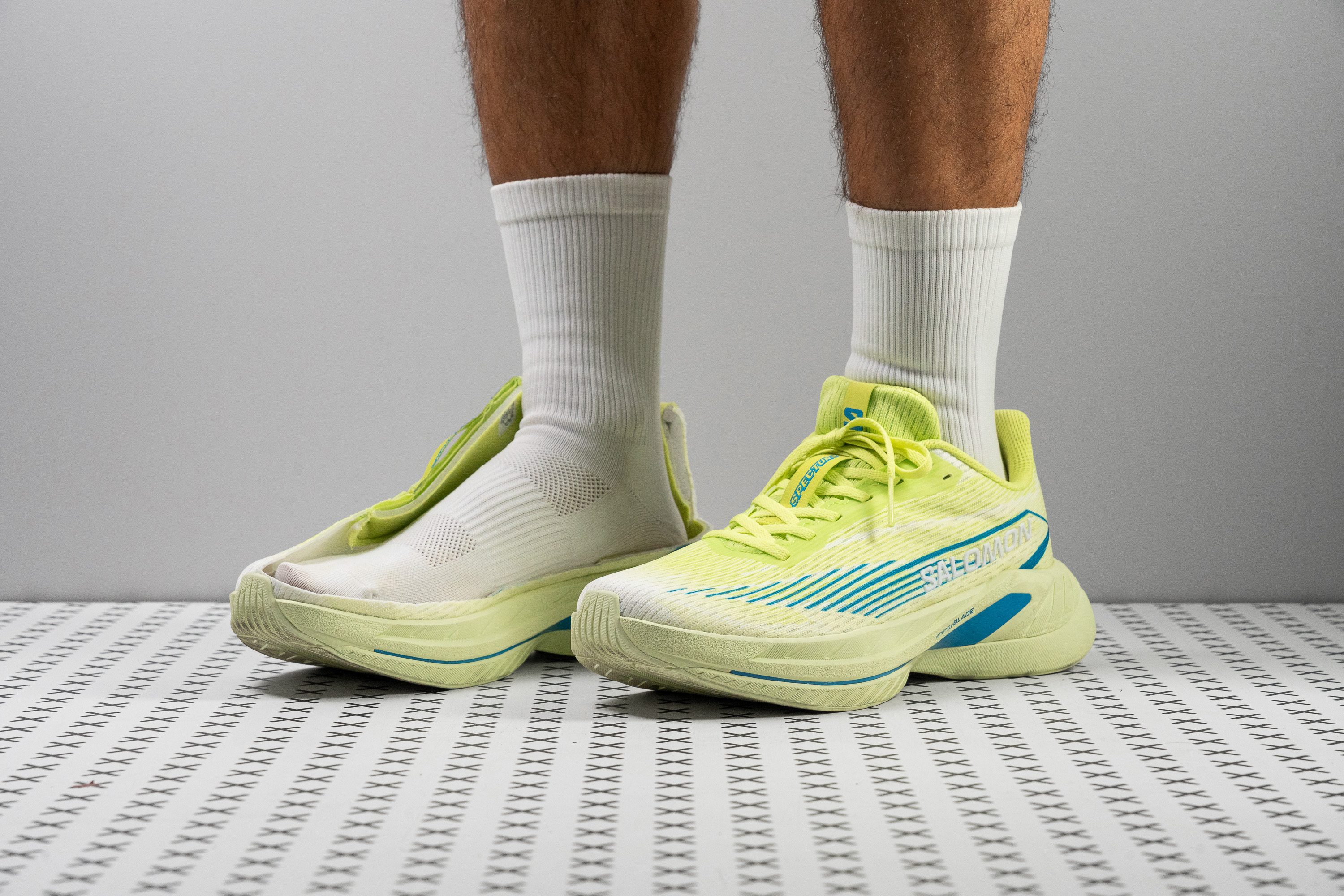Our verdict
Pros
- Good shock absorption for medium distances
- Rockered geometry offers smooth transitions
- Solid medium fit (not narrow as stated)
- Fantastic grip on wet and dry concrete
- Promising outsole durability
- Accommodates heel strikers
Cons
- Subpar energy return for the price
- Blocky heel and narrow midfoot can feel odd
- Not so breathable
Audience verdict
Comparison
The most similar running shoes compared
+ + Add a shoe | |||||
|---|---|---|---|---|---|
| Audience score | 80 Good! | 89 Great! | 91 Superb! | 82 Good! | |
| Price | $170 | $160 | $170 | $200 | |
| Pace | Tempo | Tempo | CompetitionTempo | CompetitionTempo | |
| Shock absorption | Moderate | High | High | High | |
| Energy return | Low | Moderate | Moderate | Moderate | |
| Traction | High | High | Moderate | High | |
| Arch support | Neutral | Neutral | Neutral | Neutral | |
| Weight lab Weight brand | 9.1 oz / 258g | 9.5 oz / 268g 9.5 oz / 269g | 8.7 oz / 248g 8.6 oz / 244g | 8.3 oz / 235g 8.3 oz / 235g | |
| Lightweight | ✗ | ✗ | ✓ | ✓ | |
| Drop lab Drop brand | 11.0 mm 8.0 mm | 10.1 mm 10.0 mm | 9.6 mm 8.0 mm | 8.5 mm 6.0 mm | |
| Strike pattern | Heel | Heel | HeelMid/forefoot | HeelMid/forefoot | |
| Size | - | Slightly small | True to size | True to size | |
| Midsole softness | Balanced | Soft | Soft | Balanced | |
| Difference in midsole softness in cold | Normal | Normal | Small | Small | |
| Toebox durability | Decent | Decent | Good | Decent | |
| Heel padding durability | Decent | Decent | Good | Good | |
| Outsole durability | Good | Decent | Good | Decent | |
| Breathability | Warm | Moderate | Moderate | Warm | |
| Width / fit | Medium | Narrow | Narrow | Medium | |
| Toebox width | Medium | Narrow | Medium | Narrow | |
| Stiffness | Stiff | Stiff | Stiff | Stiff | |
| Torsional rigidity | Stiff | Stiff | Stiff | Stiff | |
| Heel counter stiffness | Flexible | Flexible | Stiff | Flexible | |
| Plate | Carbon plate | Carbon plate | Carbon plate | Carbon plate | |
| Rocker | ✓ | ✗ | ✓ | ✓ | |
| Heel lab Heel brand | 35.9 mm | 37.4 mm 39.0 mm | 39.7 mm 40.0 mm | 36.9 mm 40.0 mm | |
| Forefoot lab Forefoot brand | 24.9 mm | 27.3 mm 29.0 mm | 30.1 mm 32.0 mm | 28.4 mm 34.0 mm | |
| Widths available | Normal | NormalWide | Normal | Normal | |
| Orthotic friendly | ✓ | ✓ | ✓ | ✓ | |
| Season | All seasons | All seasons | All seasons | All seasons | |
| Removable insole | ✓ | ✓ | ✓ | ✓ | |
| Ranking | #320 Bottom 16% | #105 Top 28% | #27 Top 8% | #282 Bottom 26% | |
| Popularity | #336 Bottom 12% | #50 Top 14% | #27 Top 8% | #363 Bottom 5% |
Who should buy
Based on the results of our lab and wear tests, we think that the Salomon Spectur 2 is a great match for the following:
- Runners looking for a tempo shoe with a non-aggressive rocker and a more forgiving fiberglass plate for moderate paces.
- Heel strikers who appreciate higher drops and blockier heel designs.
- Athletes in need of a road shoe suitable for cooler weather and wet roads.

Who should NOT buy
We would skip the Spectur 2 if you want a high-performance tempo shoe with the best shock absorption and energy return in a moderately-stacked platform.
The same price can get you the Saucony Endorphin Speed 5 and the PUMA Deviate Nitro 3 with significantly better cushioning metrics.
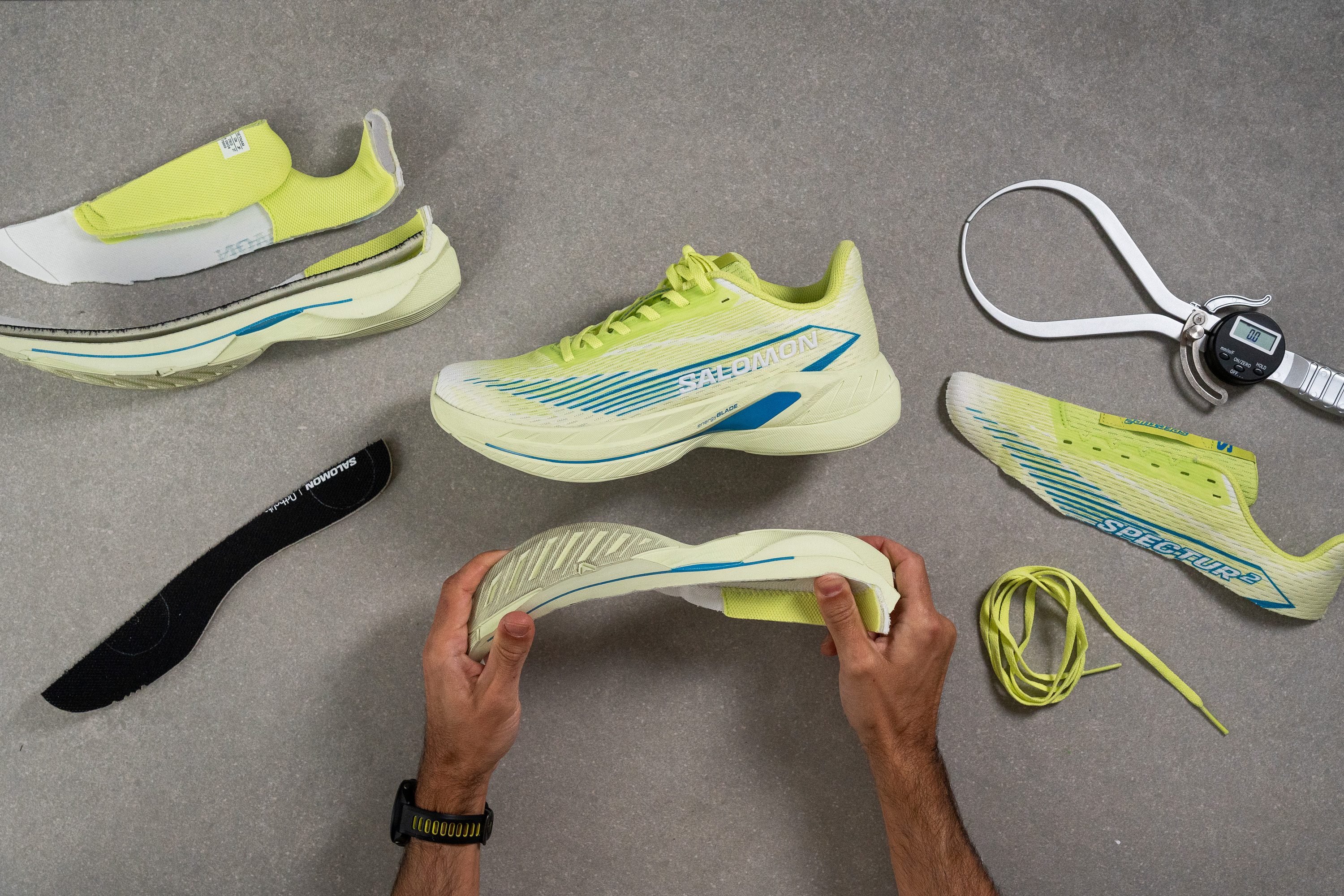
Cushioning
Shock absorption
Considering the Spectur 2's higher price point, we were surprised to see a fairly standard EVA+OBC (Olefin) optiFOAM in its midsole.
Our machine recorded a regular shock absorption measurement of 129 SA in the shoe's heel and a below-average 92 SA in the forefoot. These are the lowest readings among tempo shoes with a similar price and stack! Although we deem this impact protection sufficient for long runs up to a half-marathon, we would highly recommend at least 130 SA for a full marathon distance.
P.S. Within Salomon's road shoe range itself, you would have to shell out $50 more to get higher shock absorption from a mix of EVA+PEBA in the optiFOAM+ midsole of the S/Lab Spectur.
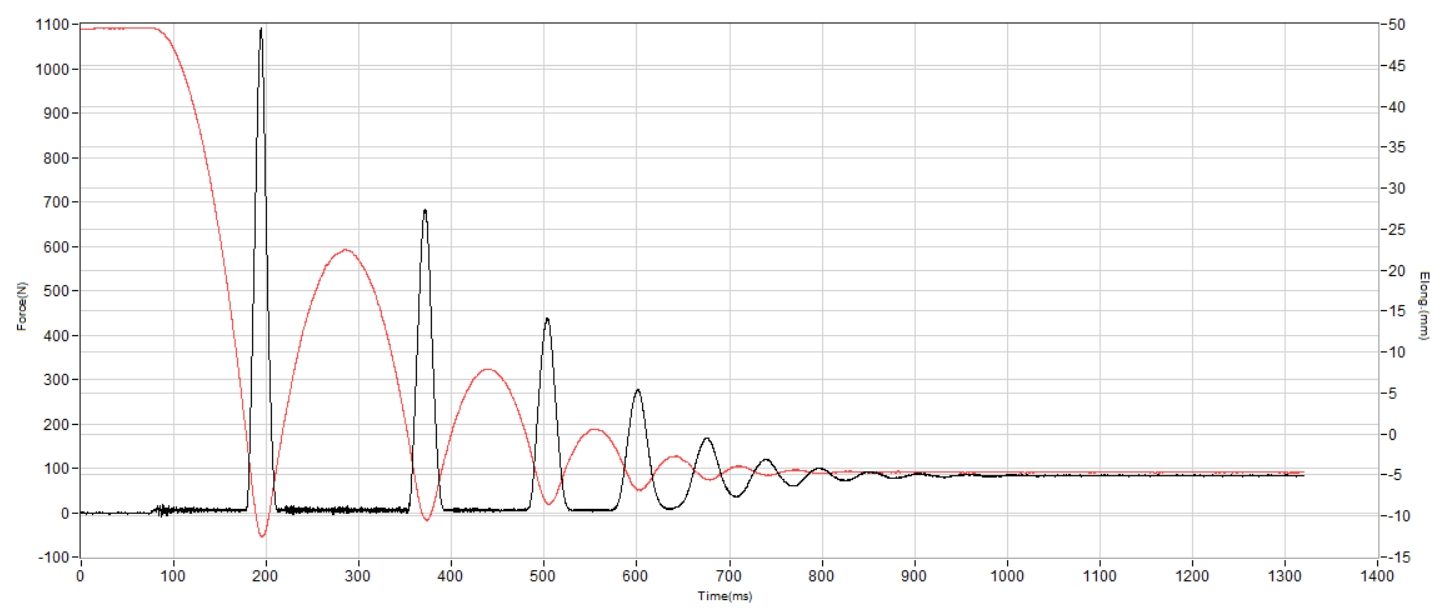
| Spectur 2 | 129 SA |
| Average | 130 SA |
Energy return
EVA-based foams have limited capacity when it comes to energy return, making the Spectur 2 less than impressive in that regard.
Our tests showed very underwhelming measurements of 53.1% in the heel and 53.2% in the forefoot. Both proved to be significantly lower than average and far from the 'PB-breaking staying power' promised by the product description.
But on a positive note, we are hopeful that Salomon implements the new eTPU blend called Energy Foam EVO in the next version of the Spectur. Observing its exceptional responsiveness in the Aero Glide 3 made us excited about what the brand is cooking for its future road shoes.
| Spectur 2 | 53.1% |
| Average | 58.6% |
Heel stack
With a caliper reading of 35.9 mm, the Salomon Spectur 2 packs a sizable slab of cushioning in the heel.
But even though it's touted as 'maximum' cushioning by the brand, we found that it's simply on par with the road running shoe average. As more and more tempo shoes cross the 40-mm mark, we keep pushing the criteria for max-cushioned shoes further and further each year!
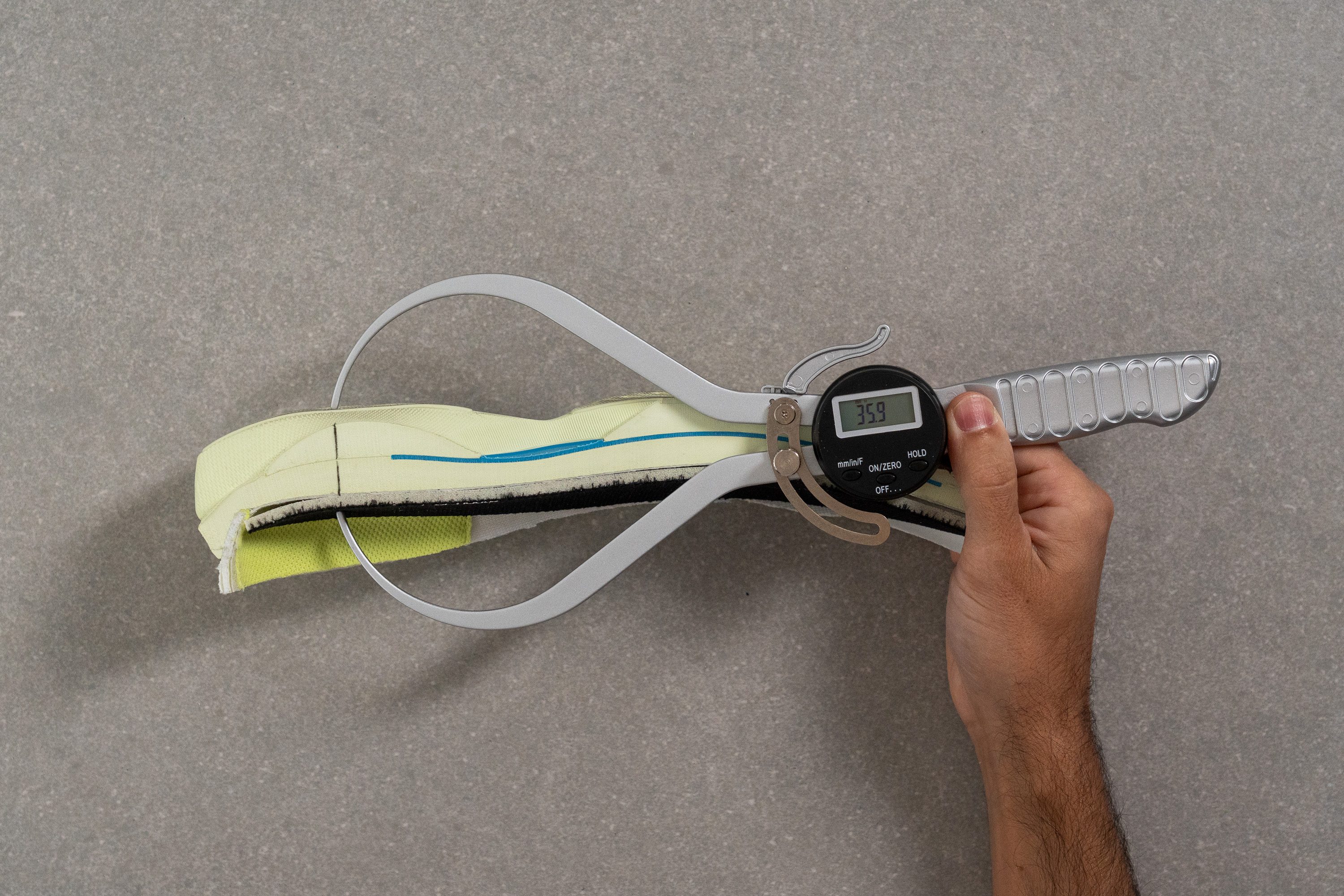
| Spectur 2 | 35.9 mm |
| Average | 34.8 mm |
Forefoot stack
The shoe's forefoot stack doesn't deviate far from the average either, showing a standard height of 24.9 mm. It is moderate enough to provide a decent ground feel and prevent you from feeling completely disconnected from the running surface.
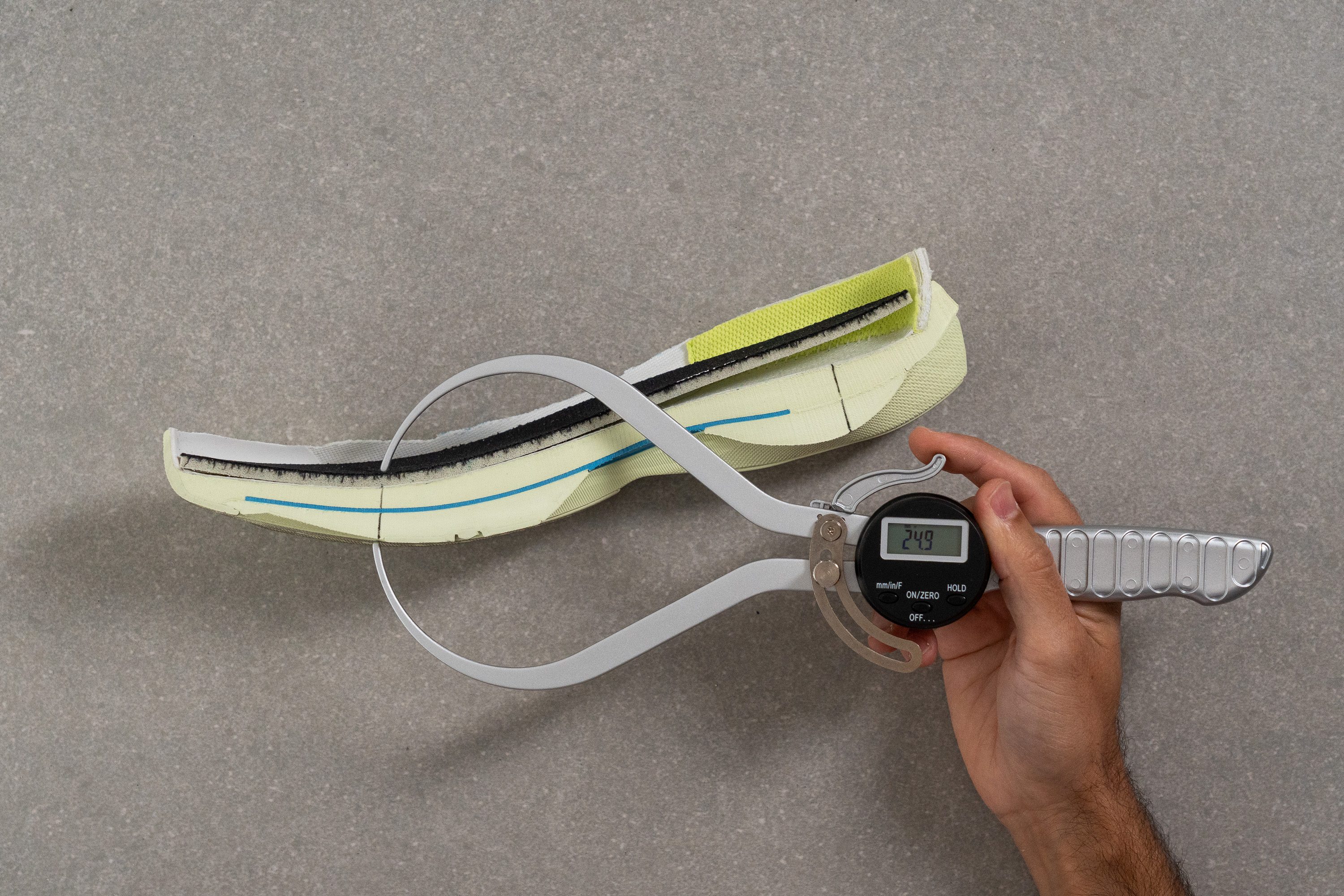
| Spectur 2 | 24.9 mm |
| Average | 26.2 mm |
Drop
If you feel like the Spectur 2's heel-to-toe drop is higher than the stated 8 mm, you are not imagining it.
According to our caliper measurements, taken at the 12% and 75% of the shoe's internal length, the shoe's actual offset comes in at 11.0 mm. This places the shoe squarely into the heel striking zone.
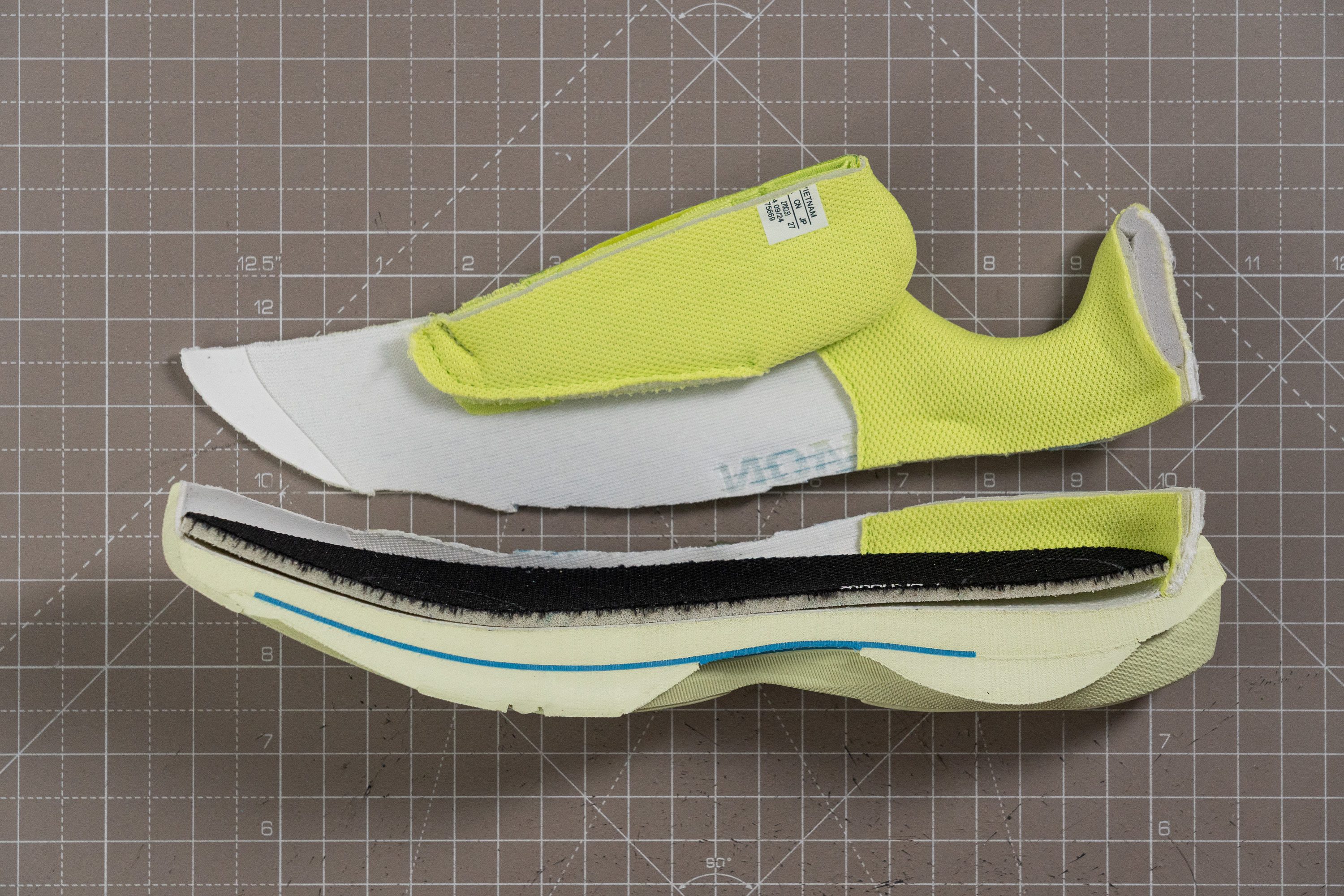
| Spectur 2 | 11.0 mm |
| Average | 8.6 mm |
Midsole softness
The Spectur 2's optiFOAM compound is not particularly plush, but its moderate softness adds a touch of stability to the shoe's ride.
Pressing a durometer against it, we recorded a middle-ground reading of 20.2 HA. This implies a balanced ride which feels firmer directly underfoot as the shoe's plastic plate is embedded in the middle of the foam.
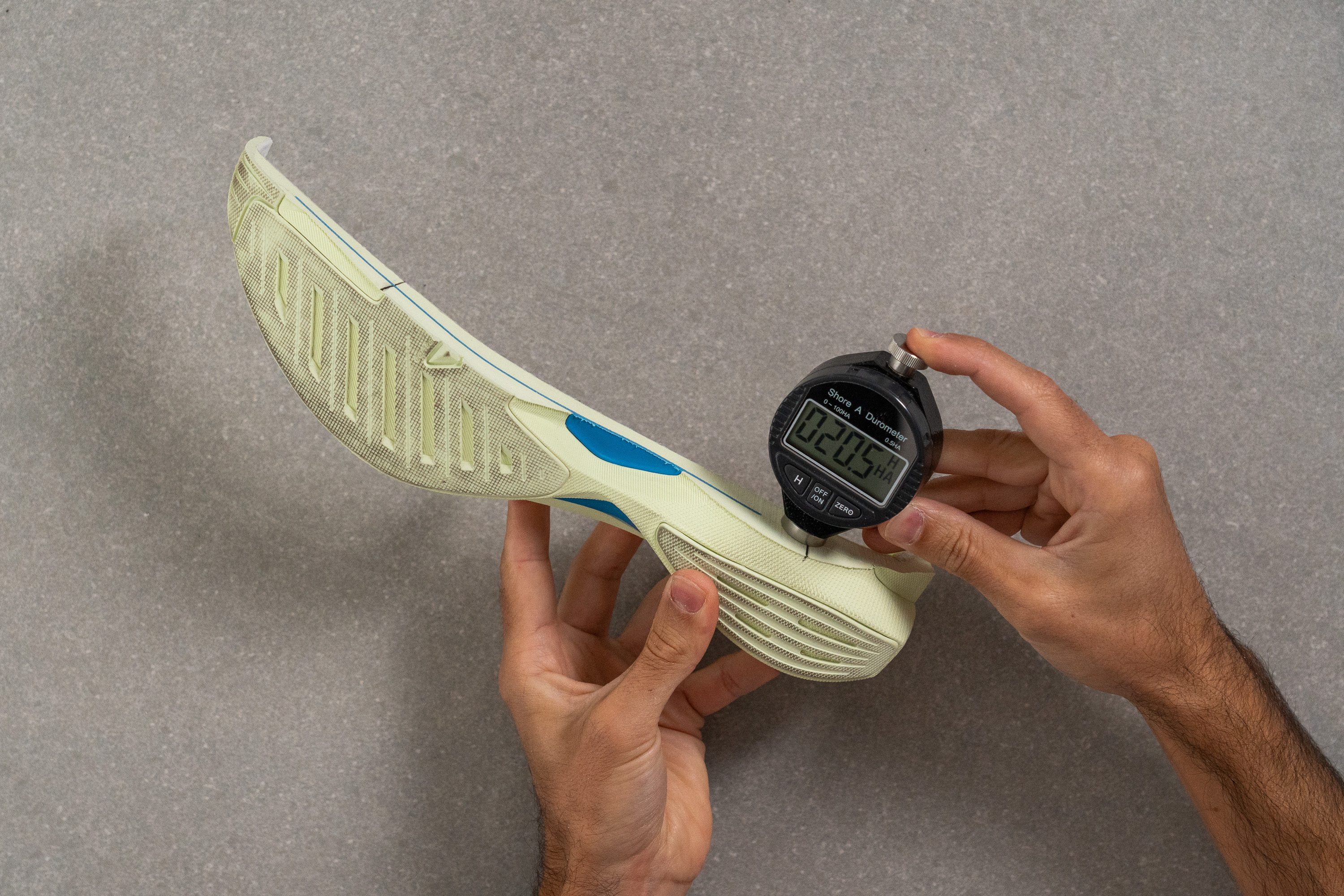
| Spectur 2 | 20.2 HA |
| Average | 20.4 HA |
Rocker
Salomon describes the Spectur 2's sole geometry as 'reverse camber', but it's just a fancy ski term for 'rocker' in running shoes.
Putting this Salomon shoe against the rulers, we can see that its curvatures are quite moderate in both the forefoot and the heel. We found its angles even milder than those of the Saucony Endorphin Speed 5 and the PUMA Deviate Nitro 3.
This makes the Spectur 2 more versatile for slower training paces, as it doesn't force turnovers as the more aggressively rockered tempo shoes. But it does make heel-to-toe transitions smoother and gentler.
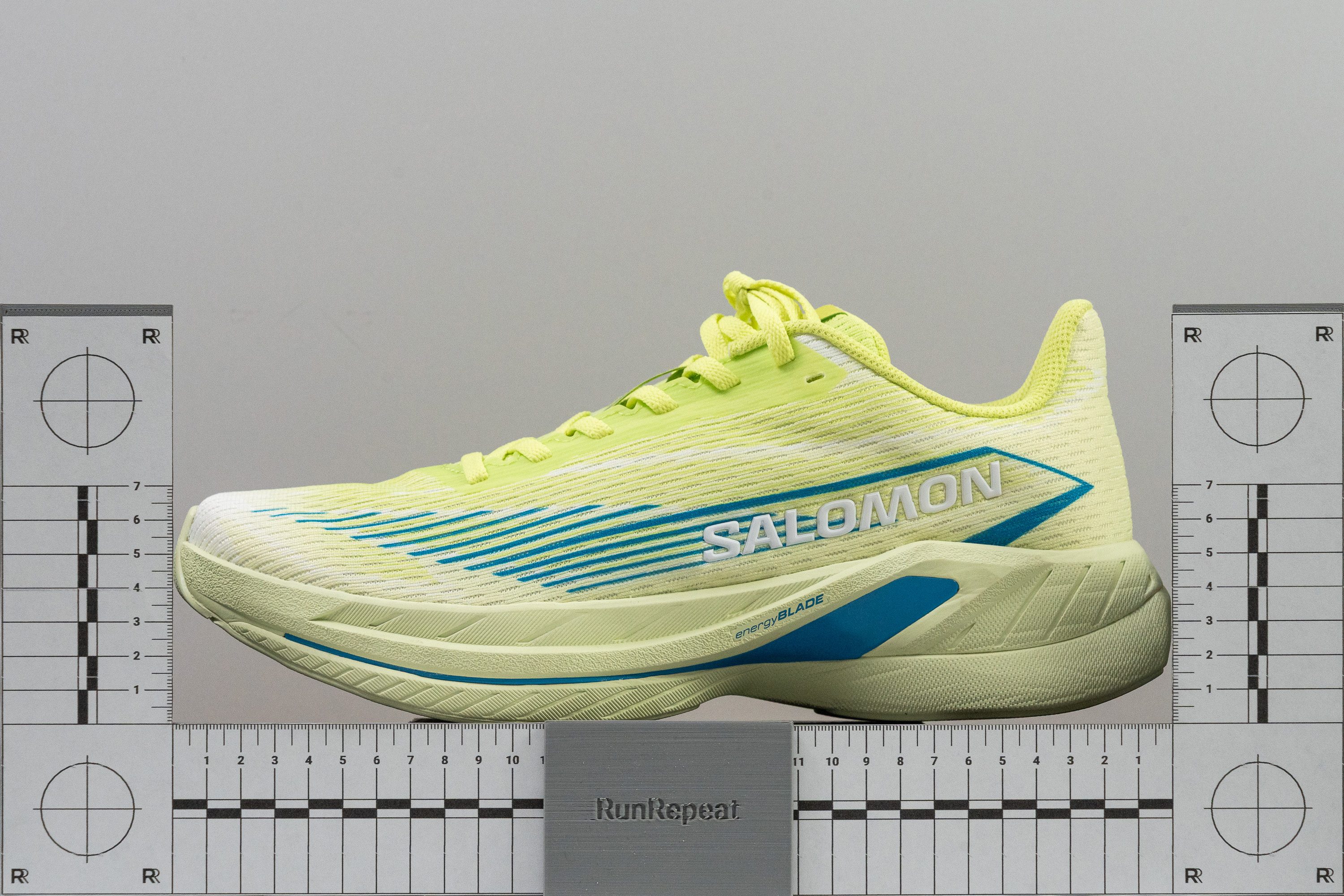
Plate
Salomon employs a fiberglass energyBLADE CF plate in about two-thirds of its midsole length.
It also protrudes outwards in the midfoot area, forming wings on both sides for added support.
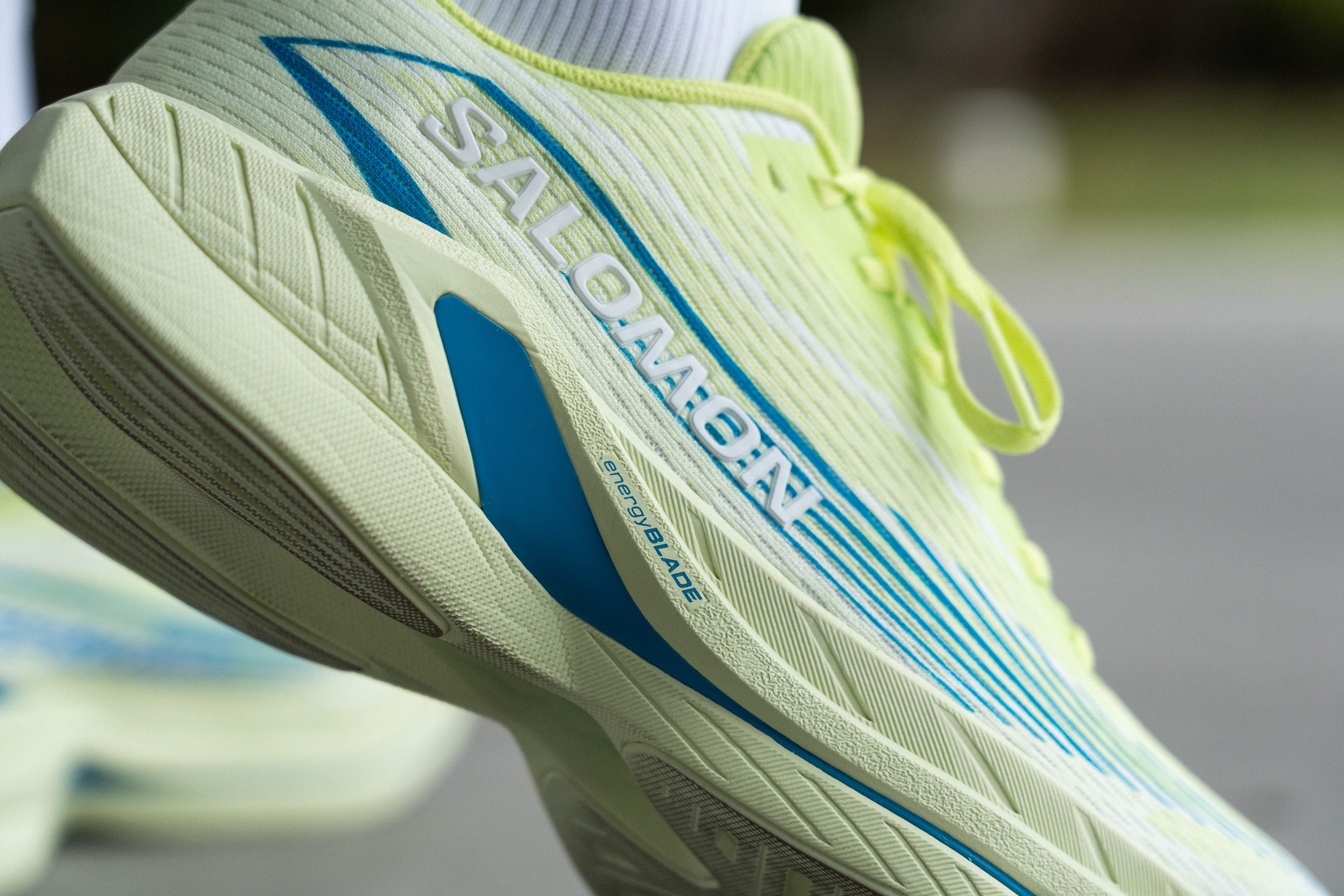
Unlike most carbon fiber plates used today, it has more of a plasticy nature to it, which makes it more forgiving and therefore, not as aggressively propulsive.
While it adds some snappiness to the toe-offs, we felt like this plate's primary function was more about giving some stability and structure to the Spectur 2.
Size and fit
Size
Width / Fit
Salomon informs buyers about the Spectur 2's narrow fit right from the start, in its product specs. But how does it compare to all the other road shoes in our lab?
Having filled the shoe's forefoot with custom liquid, we allowed it to solidify in the freezer and form a one-to-one gel mold of the Spectur 2's interiors.
Measuring the widest part of the mold (ball of the foot area) with a digital caliper, we got a pretty standard reading of 95.0 mm. It's far from the narrow range (less than 91.0 mm) and is on par with all the other road running shoes we've tested in a D medium width (men's US size 9).
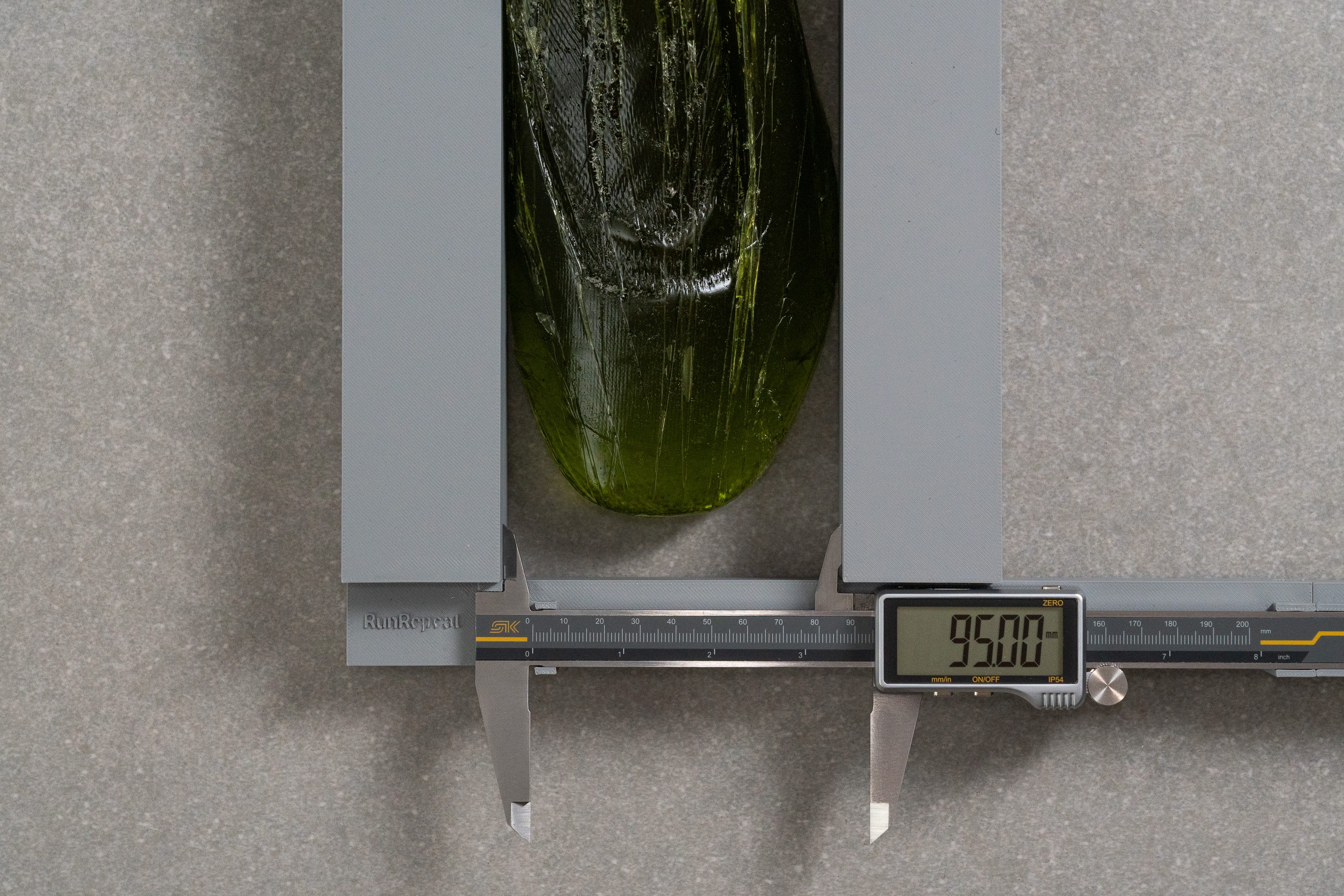
| Spectur 2 | 95.0 mm |
| Average | 95.1 mm |
Toebox width
The toebox tapering is not particularly evident in this shoe either.

Measuring its width in the big toe area returned another standard reading of 73.9 mm. So, looks like the Spectur 2 is not your typical snug-fitting Salomon shoe.
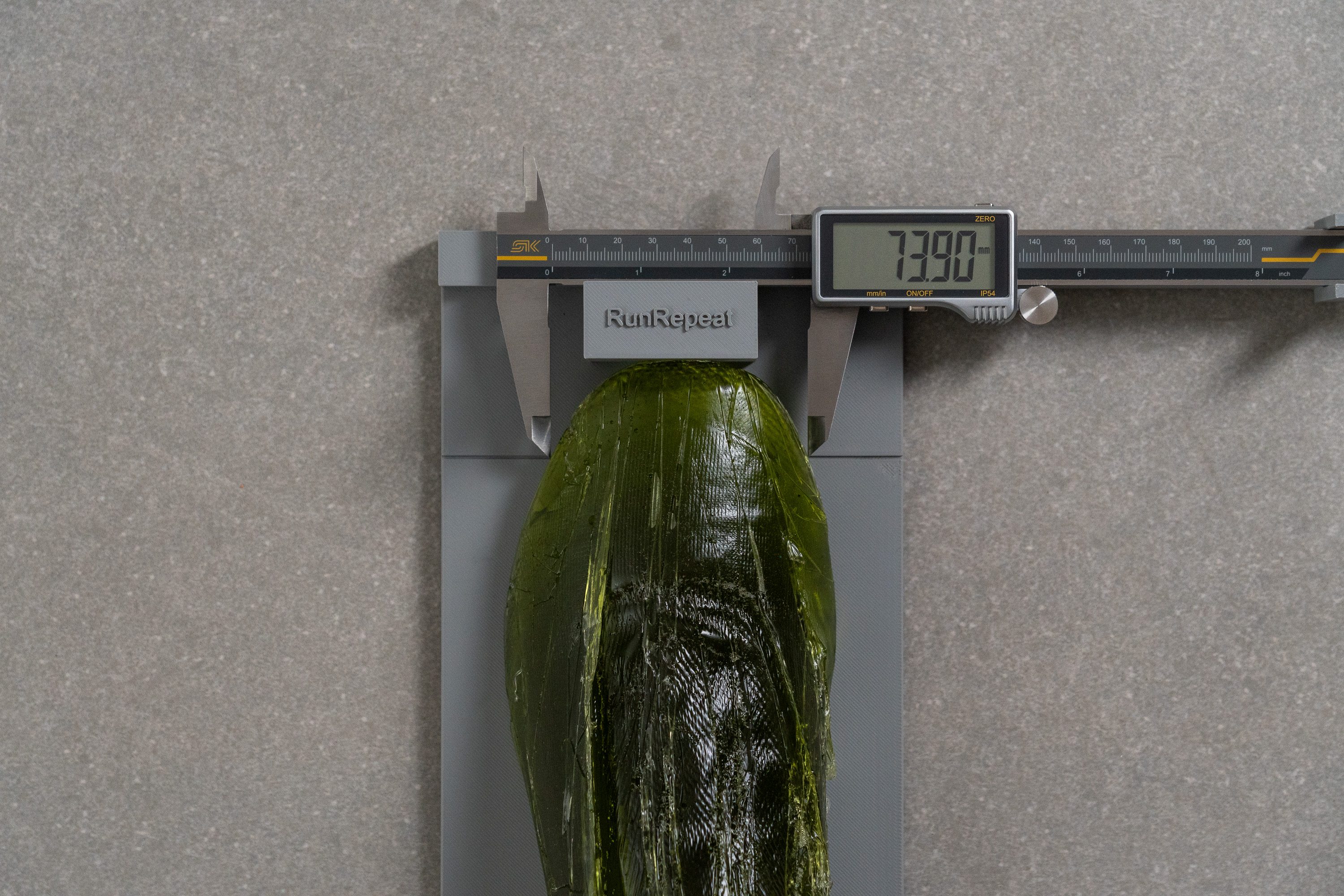
| Spectur 2 | 73.9 mm |
| Average | 73.3 mm |
Toebox height
In the vertical perspective, the shoe's toebox sits pretty close to the toes, but not in a constricting way.
With a toebox height of 25.8 mm, it feels like most other tempo running shoes.
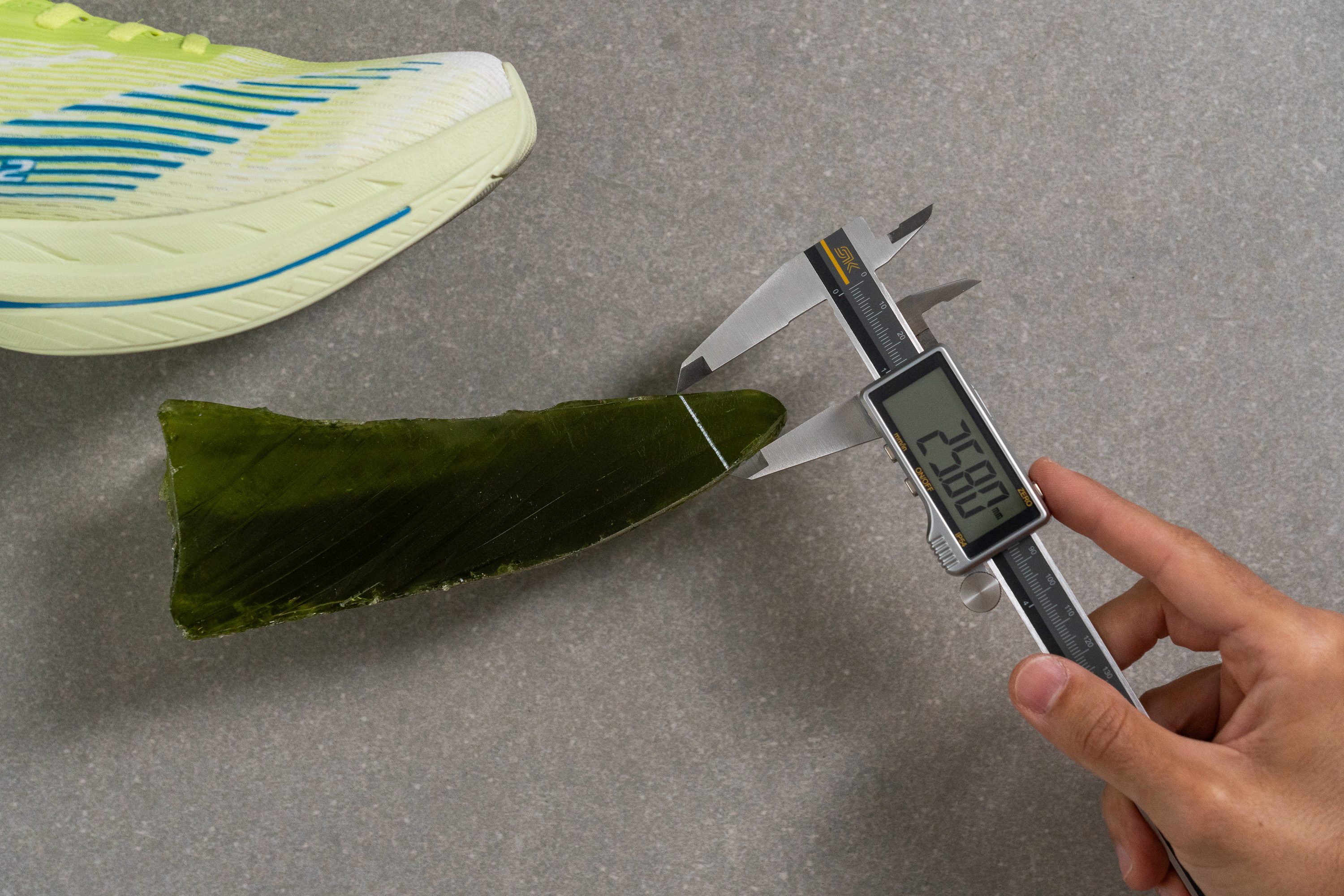
| Spectur 2 | 25.8 mm |
| Average | 27.0 mm |
Traction / Grip
Traction test
If there is one brand that never fails when it comes to outsole grip, it's got to be Salomon. The company channels decades of experience on slippery rocks into a Road contaGRIP outsole used on the Spectur 2.
And the result? An above-average friction coefficient of 0.54 on a wet slab of concrete!
If you expect to remain confident when taking sharp turns on wet pavements and other slippery urban surfaces, you won't be disappointed.
| Spectur 2 | 0.54 |
| Average | 0.49 |
Outsole design
This Salomon shoe features flat and broad treads for optimal bite on hard and flat surfaces like concrete, asphalt, and track.
Even though its midfoot hardly touches the ground, you get plenty of contact area in the heel and forefoot.
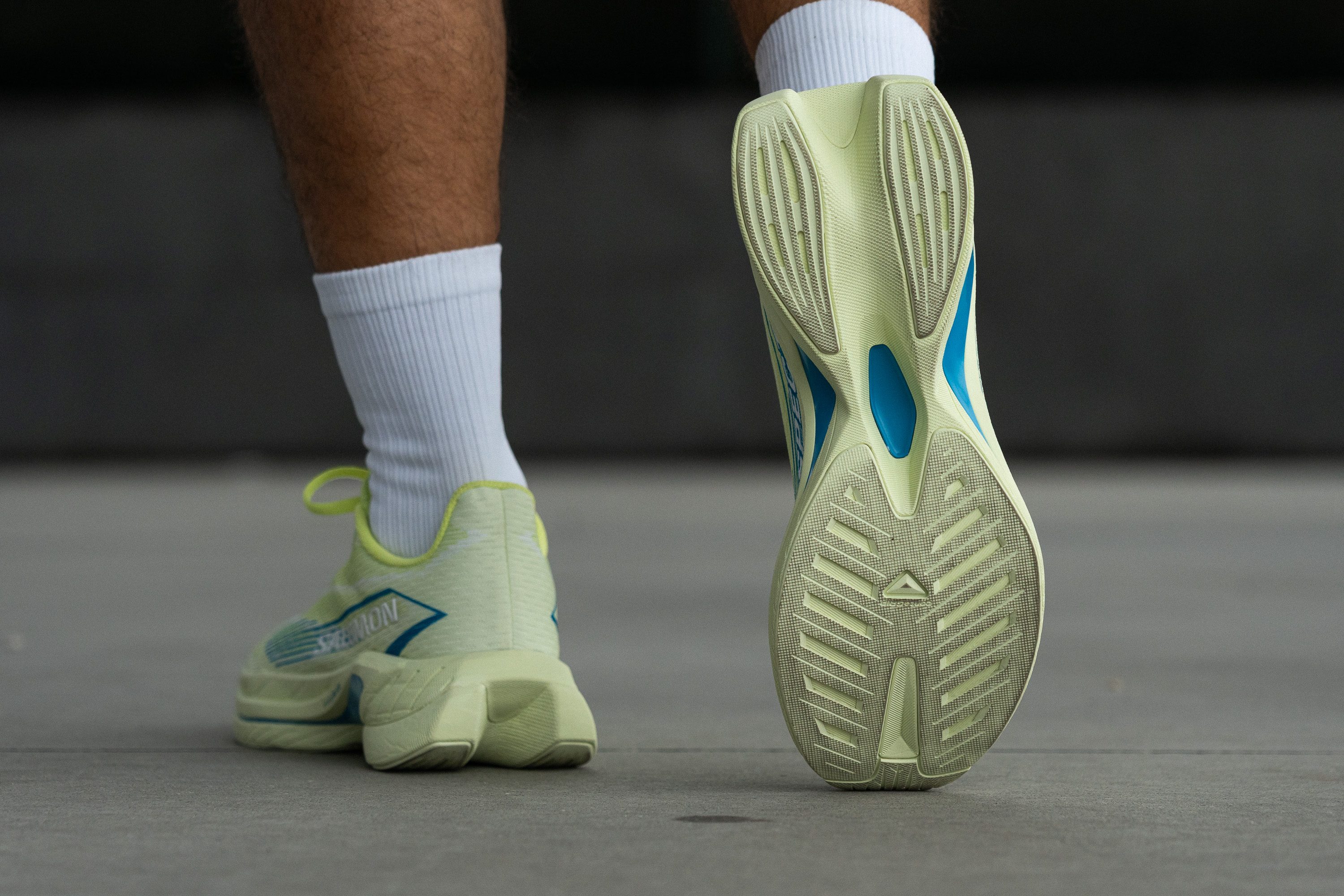
Flexibility / Stiffness
Although the shoe's midsole plate is not made of stiff carbon fiber, it's still a large piece of plastic that doesn't let the shoe bend so easily.
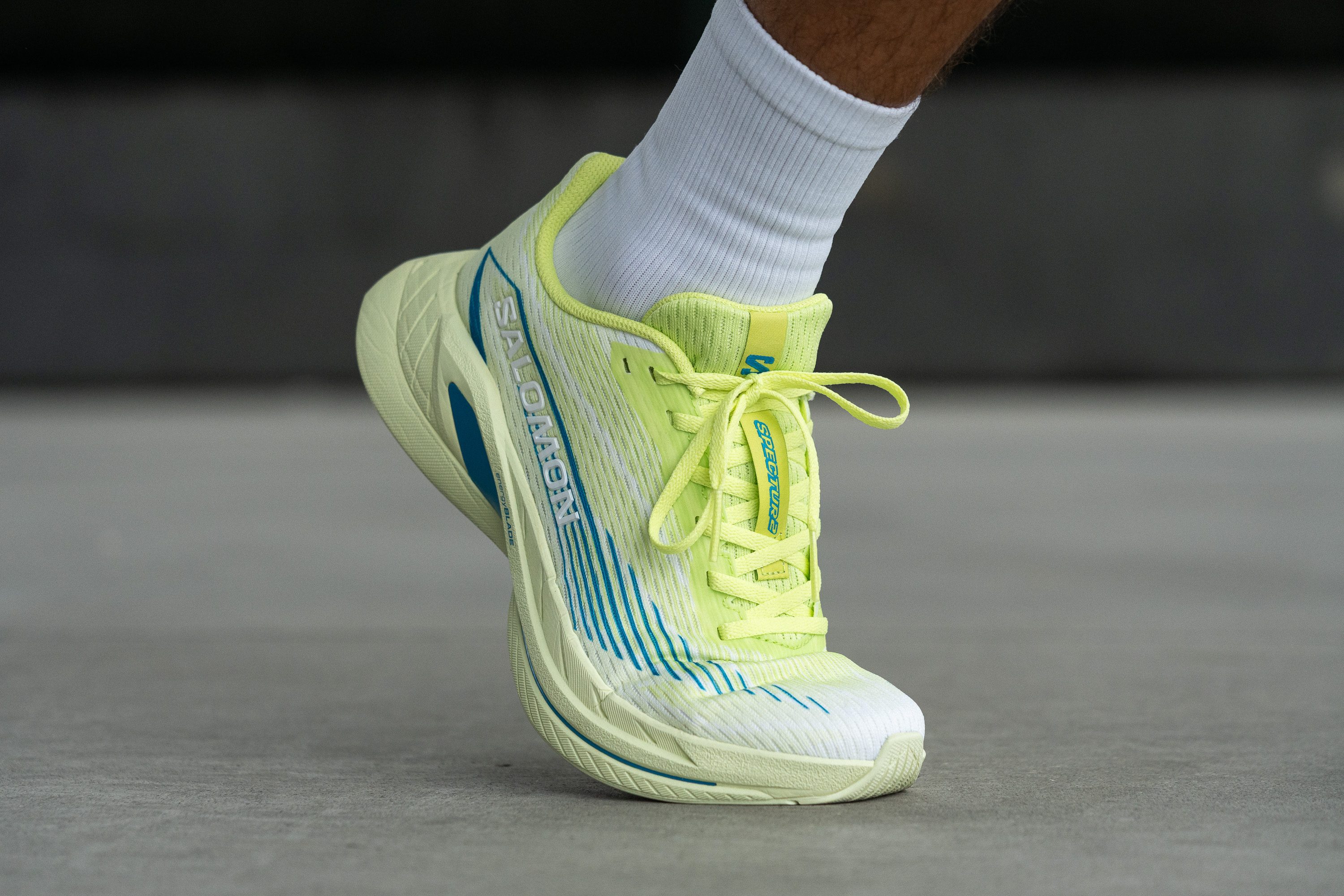
Our shoe stiffness tester measured that it takes 19.5N of force to bend the Salomon Spectur 2 by 30 degrees. It's a bit more than the average road shoe requires, but rather moderate as far as plated tempo shoes are concerned.
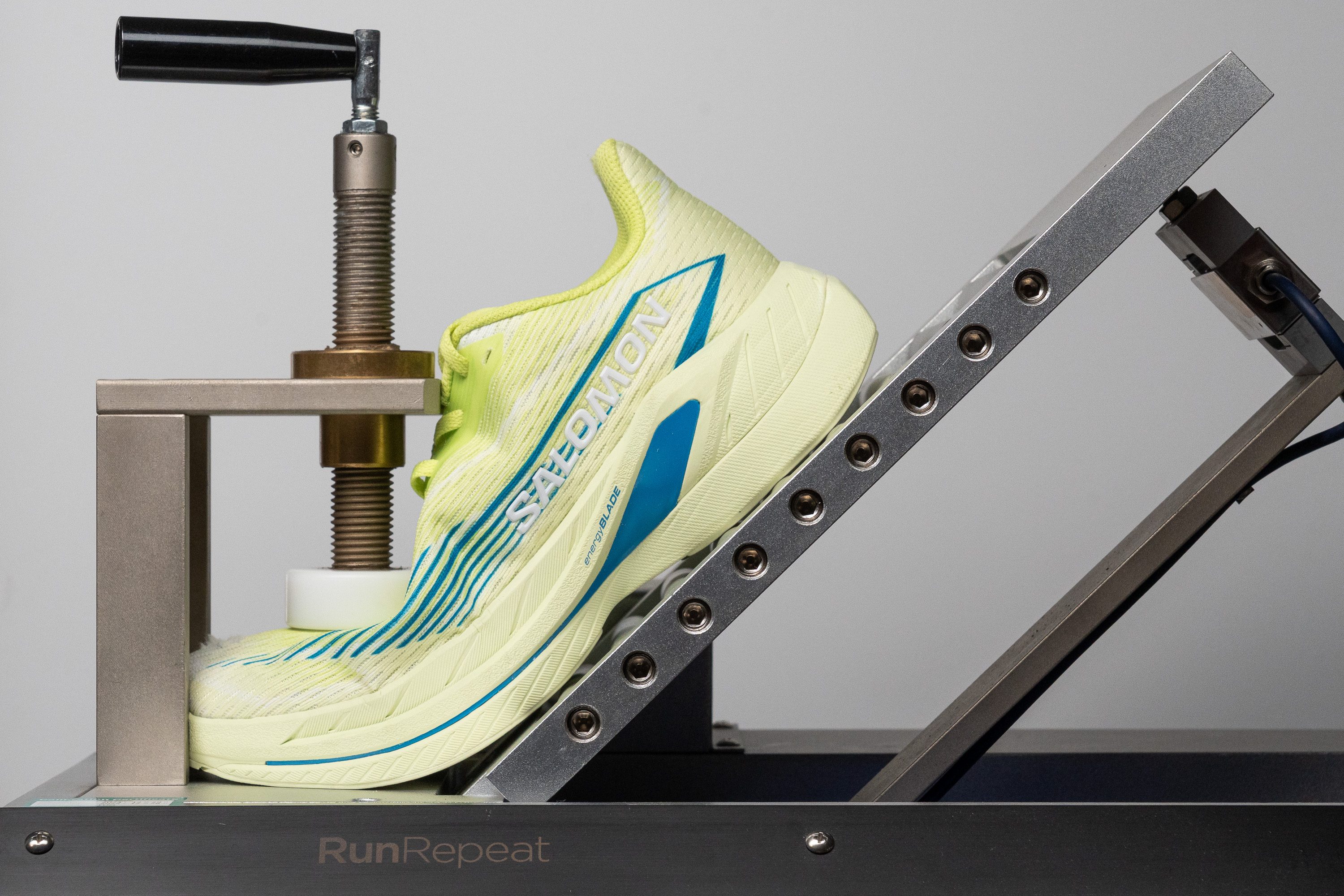
| Spectur 2 | 19.5N |
| Average | 15.3N |
Weight
In general, we can't complain about the Spectur 2's weight as it tipped the scale at a below-average reading of 9.1 oz (258g) in a men's US size 9.
However, when put in the context of tempo shoes, Salomon definitely needs to update the Spectur's midsole foam with a lighter compound if it wants to stay competitive with the other speed shoes in this price range.

| Spectur 2 | 9.1 oz (258g) |
| Average | 9.3 oz (264g) |
Breathability
The Spectur 2's 3D open mesh sounded pretty breathable on paper, but, unfortunately, our lab tests showed the opposite.
As transparent as the shoe's upper material seemed against the light, the smoke billows coming out of its toebox turned out to be rather thin and slow.
Upon closer examination, we could see that the mesh pores in the fabric weren't large enough to promote strong air circulation.
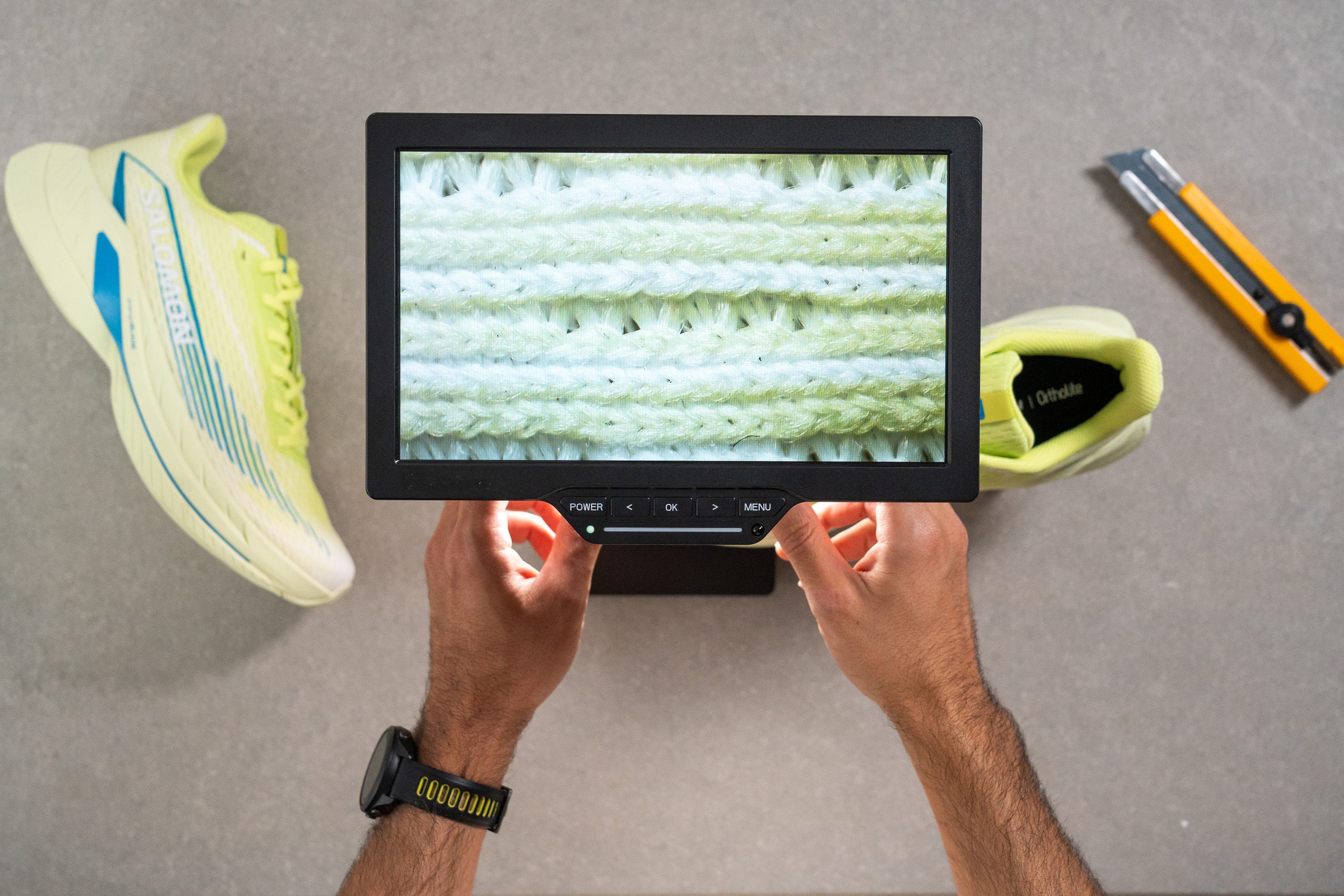
Because of that, we lowered the Spectur 2's overall breathability score to only 2 out of 5. It's not your best bet for hot summer runs.
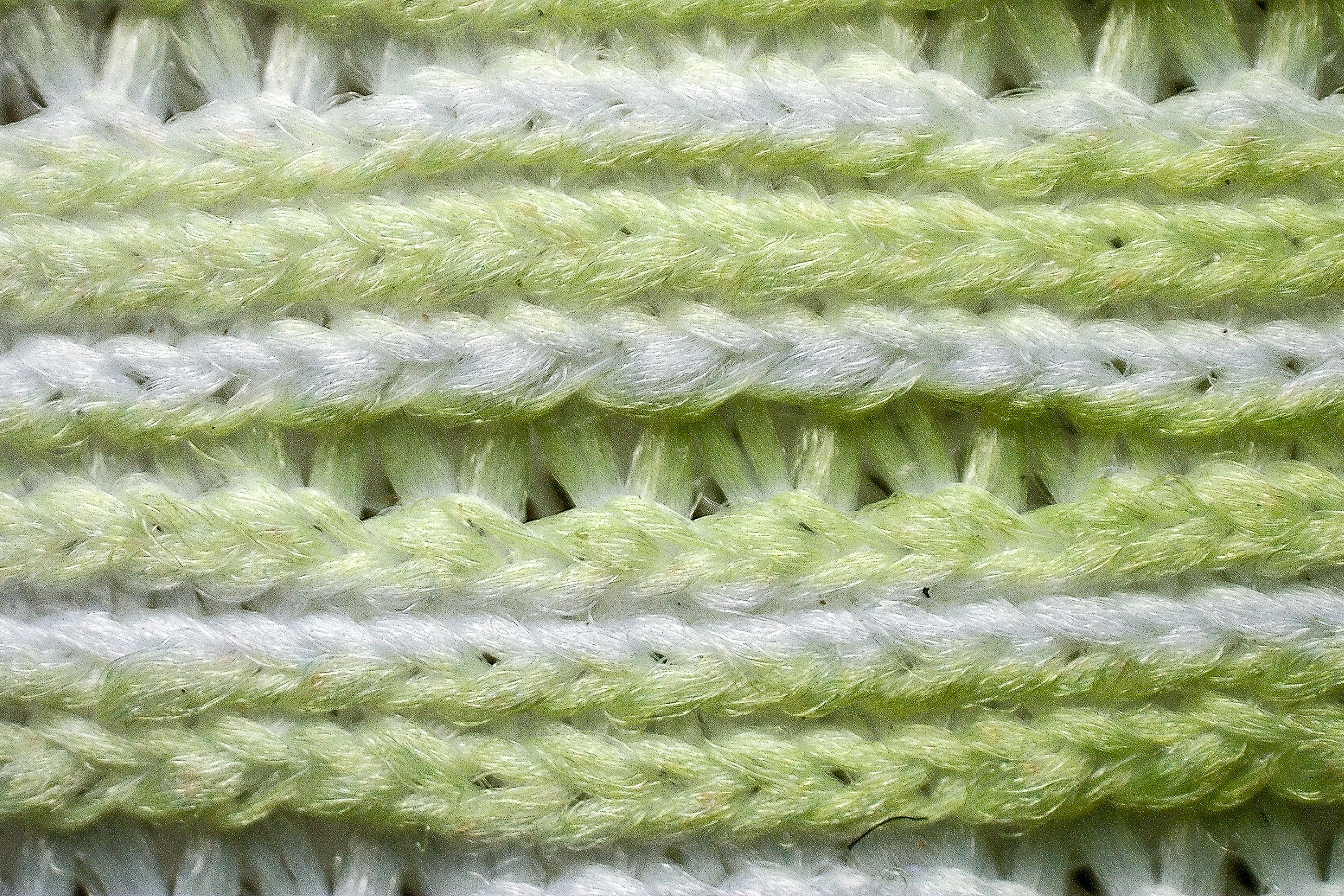
| Spectur 2 | 2 |
| Average | 3.7 |
Stability
Lateral stability test
The Specture 2's extended hoof-like heel works together with supportive elements in the rearfoot (the plate wings and the raised midsole topline) to add a touch of stability upon heel landing. Because the shoe's higher drop clearly prompted us to land on our heels.
However, each landing transitioned into the shoe's extremely narrow midfoot, which somewhat neutralized the supportive heel.

Salomon calls it 'game-changing stability,' but we want to make it very clear that the Specture 2 is a purely neutral running shoe.
Torsional rigidity
Despite its aggressively narrow midfoot, the Spectur 2 has a lot of torsional rigidity to it!
The plate and the sidewalls made it impossible to twist the shoe in our manual test, raising our stiffness score to the maximum 5 out of 5!
This prevents the shoe from feeling too tippy in the arch area during the running gait cycle.
| Spectur 2 | 5 |
| Average | 3.5 |
Heel counter stiffness
The shoe's heel counter yielded very easily to our manual pushing and squeezing, scoring very low on our stiffness scale - only 2 out of 5.
This pliability can make some heel strikers feel like the ankle is too mobile and detracting from the Spectur 2's rearfoot stability.
| Spectur 2 | 2 |
| Average | 2.9 |
Midsole width - forefoot
The forefoot and heel areas of this Salomon shoe may appear pretty wide in relation to its slim midfoot.
But when we measured the widest area of the shoe's midsole in the forefoot, we got an even slightly below-average reading of 107.9 mm.
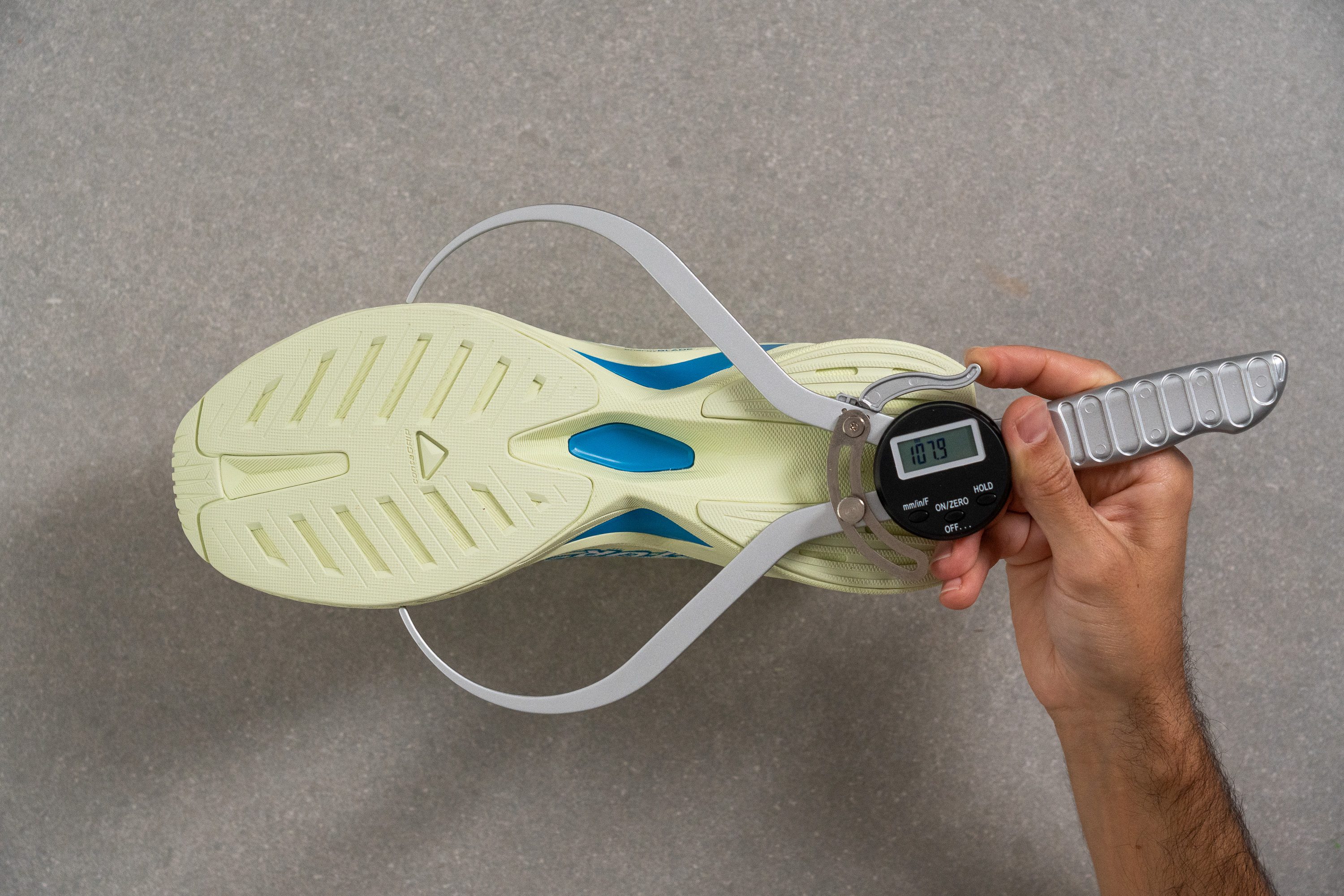
| Spectur 2 | 107.9 mm |
| Average | 114.4 mm |
Midsole width - heel
As bulky as the shoe's heel looks from the outside, its widest area turned out to be only average at 90.8 mm.
But there is nothing to complain about, as these dimensions are just right for a nimble tempo shoe for neutral pronation.
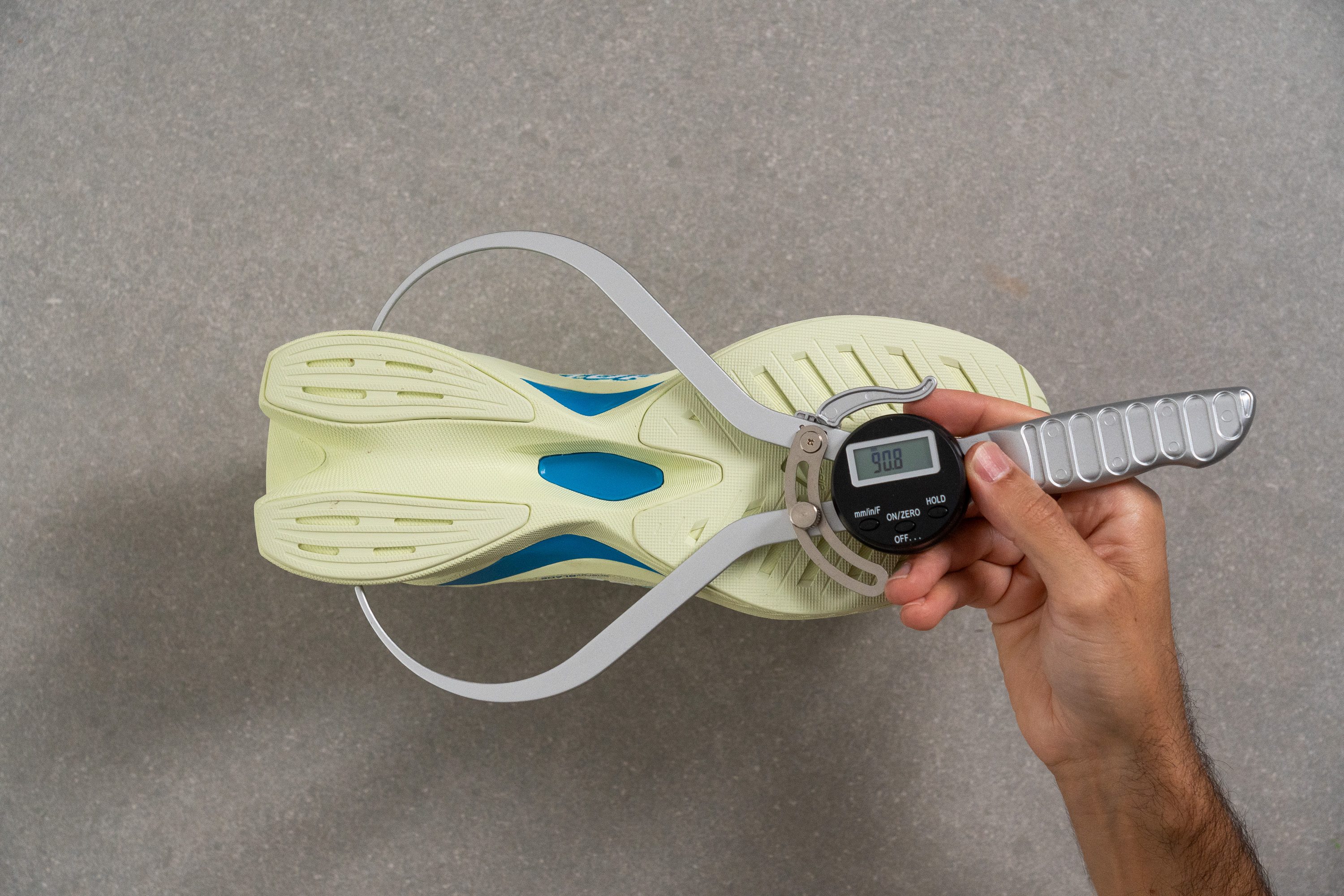
| Spectur 2 | 90.8 mm |
| Average | 90.6 mm |
Durability
Toebox durability
We were hoping that the shoe's mildly breathable upper material would pay back with enhanced durability, but that's not the case in the Spectur 2.
The fabric sustained some visible damage in our Dremel test, earning a moderate toebox durability score of 3/5.
| Spectur 2 | 3 |
| Average | 2.6 |
Heel padding durability
The airy mesh lining inside the collar didn't show any impressive results either.
Easily torn by sandpaper in a matter of seconds, we lowered the shoe's heel padding durability score to 2/5.
| Spectur 2 | 2 |
| Average | 3.4 |
Outsole durability
But thank god we can rely on Salomon outsoles for wear resistance! The blend survived our demanding drilling session with a moderate dent of 0.9 mm, which is normal for a road running shoe.
| Spectur 2 | 0.9 mm |
| Average | 1.1 mm |
Outsole thickness
The amount of outsole rubber also proved to be on par with the average, with a thickness of 2.7 mm.

| Spectur 2 | 2.7 mm |
| Average | 3.2 mm |
Misc
Insole thickness
A well-padded insole measured 3.9 mm in thickness in the heel area.
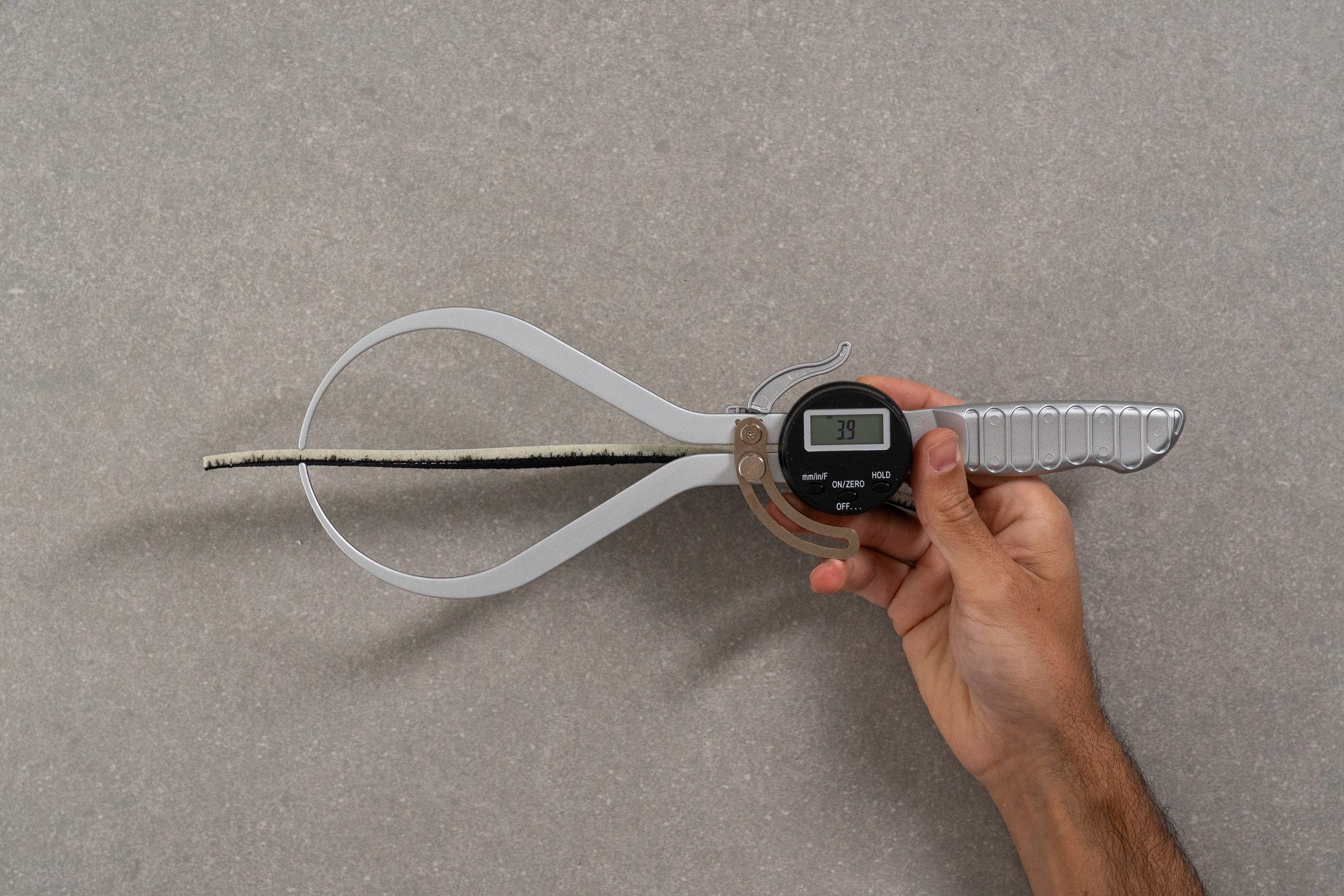
| Spectur 2 | 3.9 mm |
| Average | 4.5 mm |
Removable insole
It is a good quality Ortholite insole, but you can easily swap it for a custom orthotic of your own.
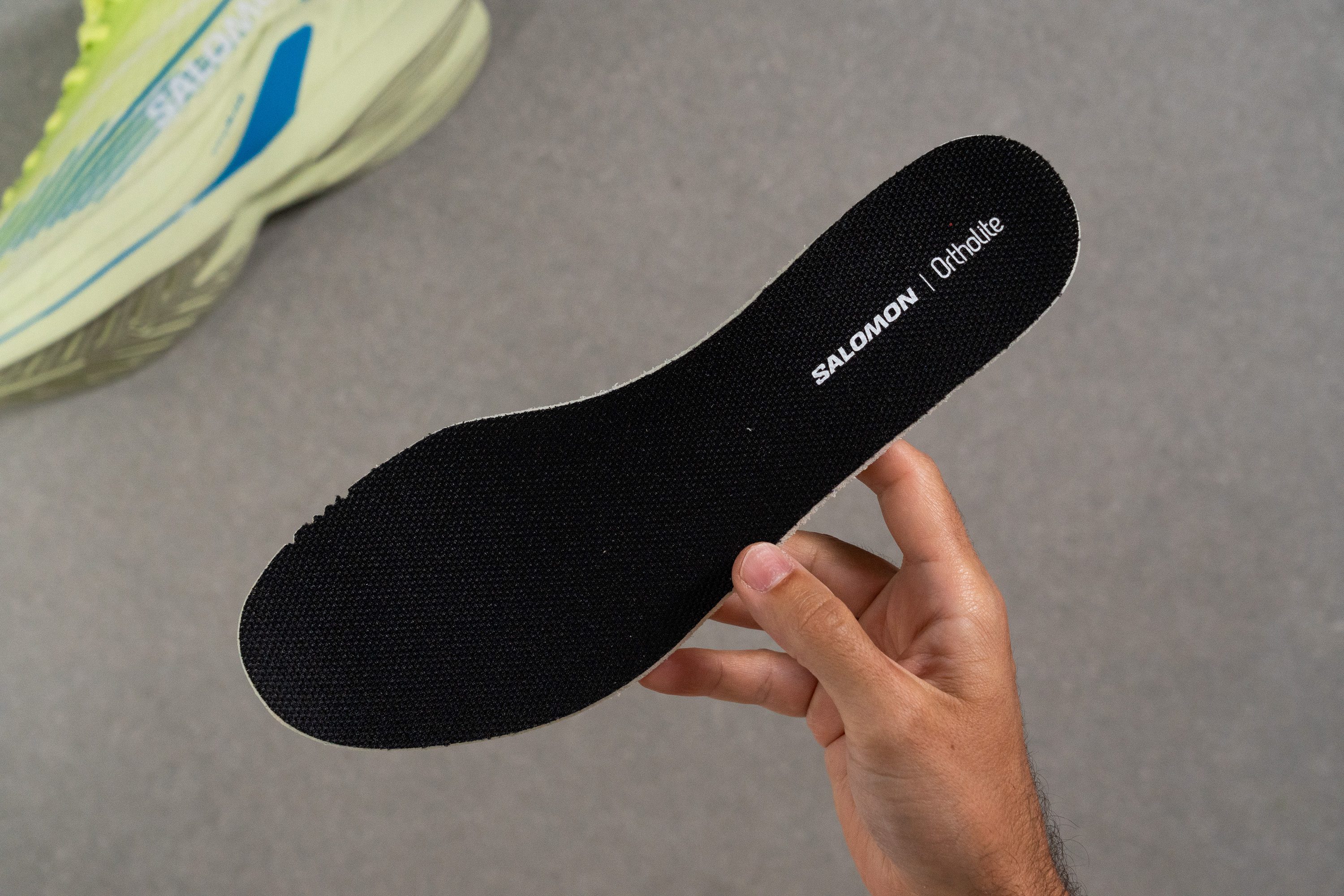
| Spectur 2 | Yes |
Midsole softness in cold (%)
The Spectur 2's low breathability score makes it more suitable for cooler temperatures, but how about its cushioning?
Taking durometer measurements before and after keeping the shoe in the freezer for 20 minutes, we recorded a difference of 34%. The foam got notably firmer in cold conditions.
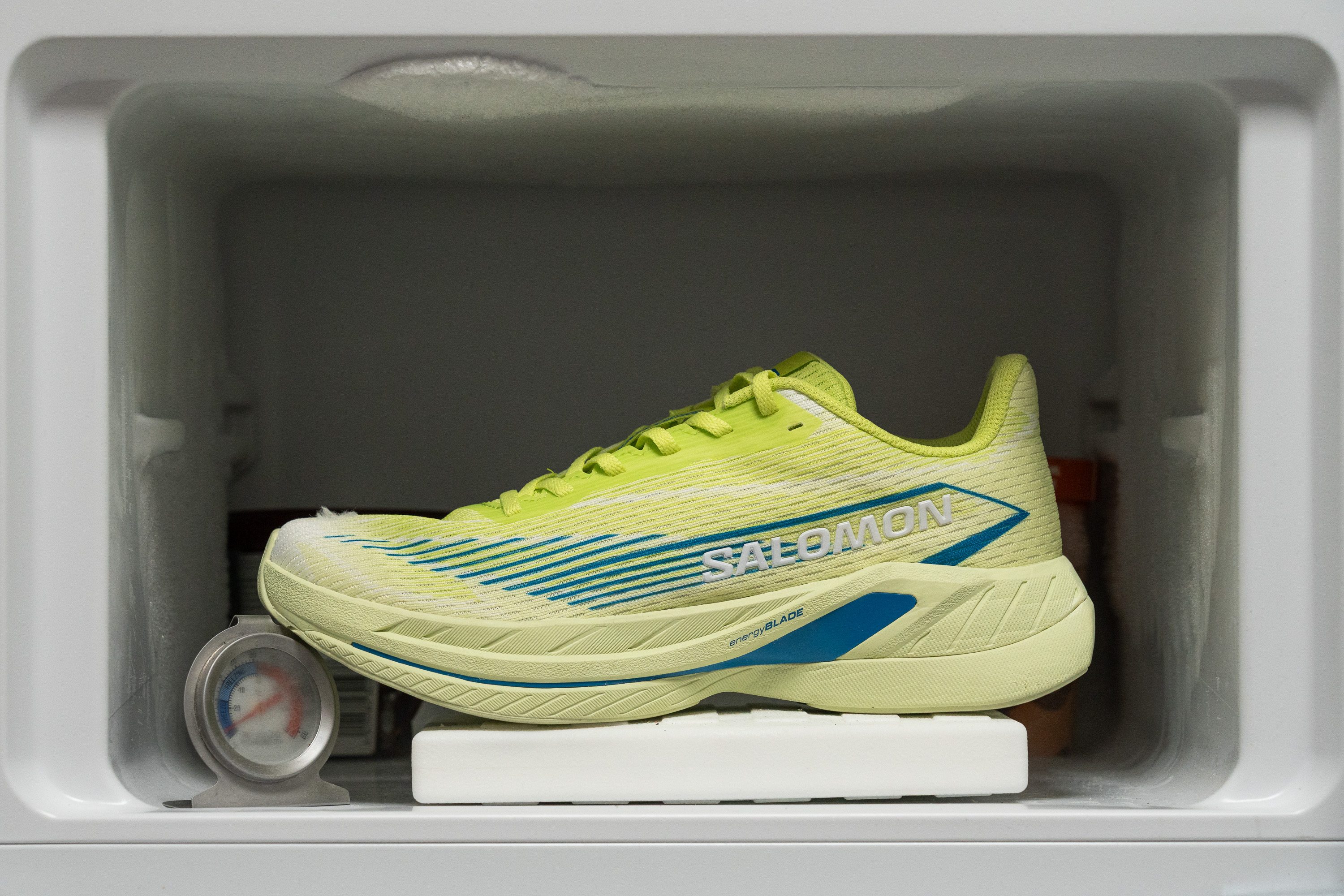
| Spectur 2 | 34% |
| Average | 24% |
Reflective elements
There are no reflective elements on this Salomon shoe, which means zero visibility in low-light conditions.
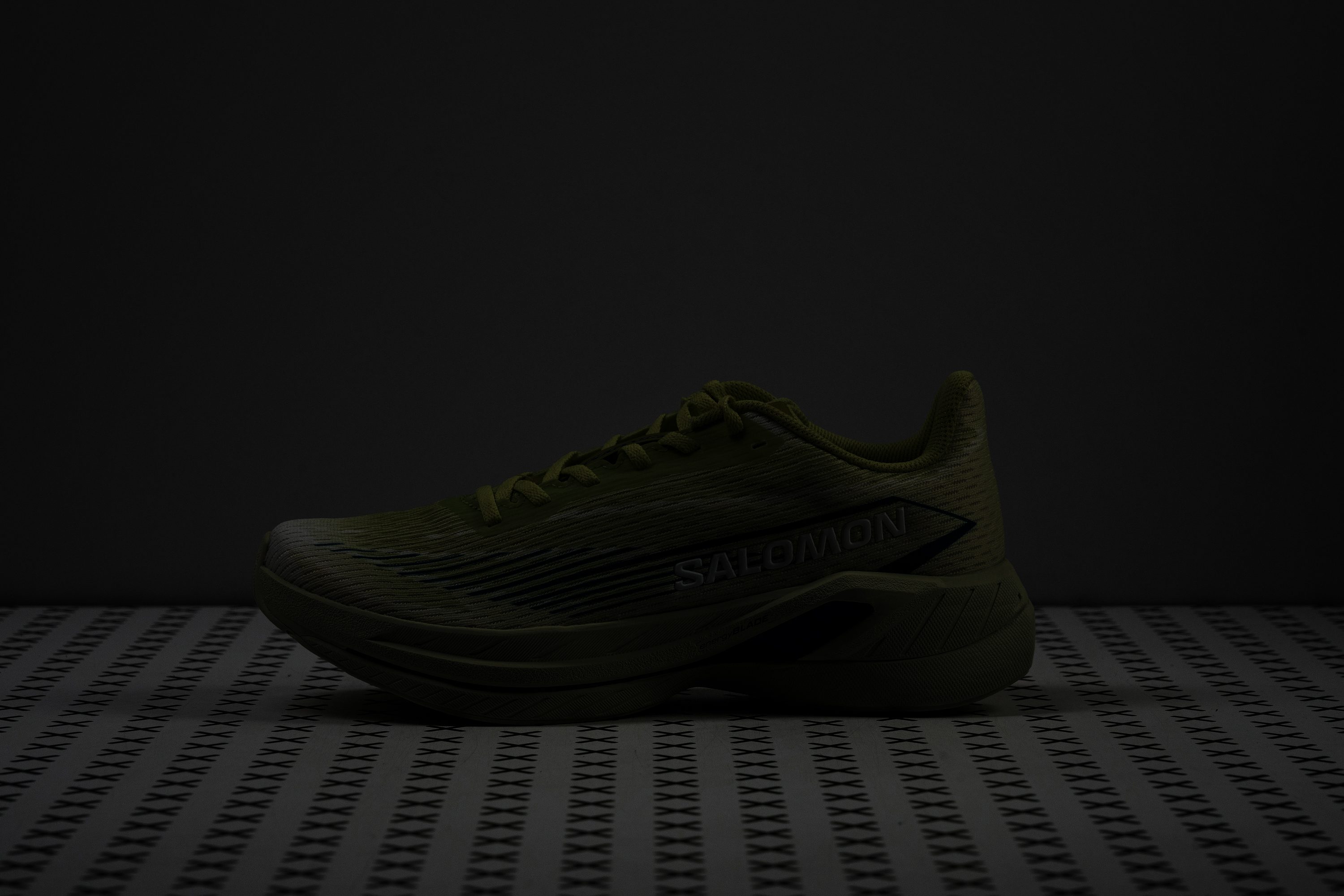
| Spectur 2 | No |
Tongue padding
We found the Spectur 2 to be adequately padded for a tempo shoe.
With a moderate tongue thickness of 6.0 mm, it effectively prevents lace bites and top-of-the-foot pressure.
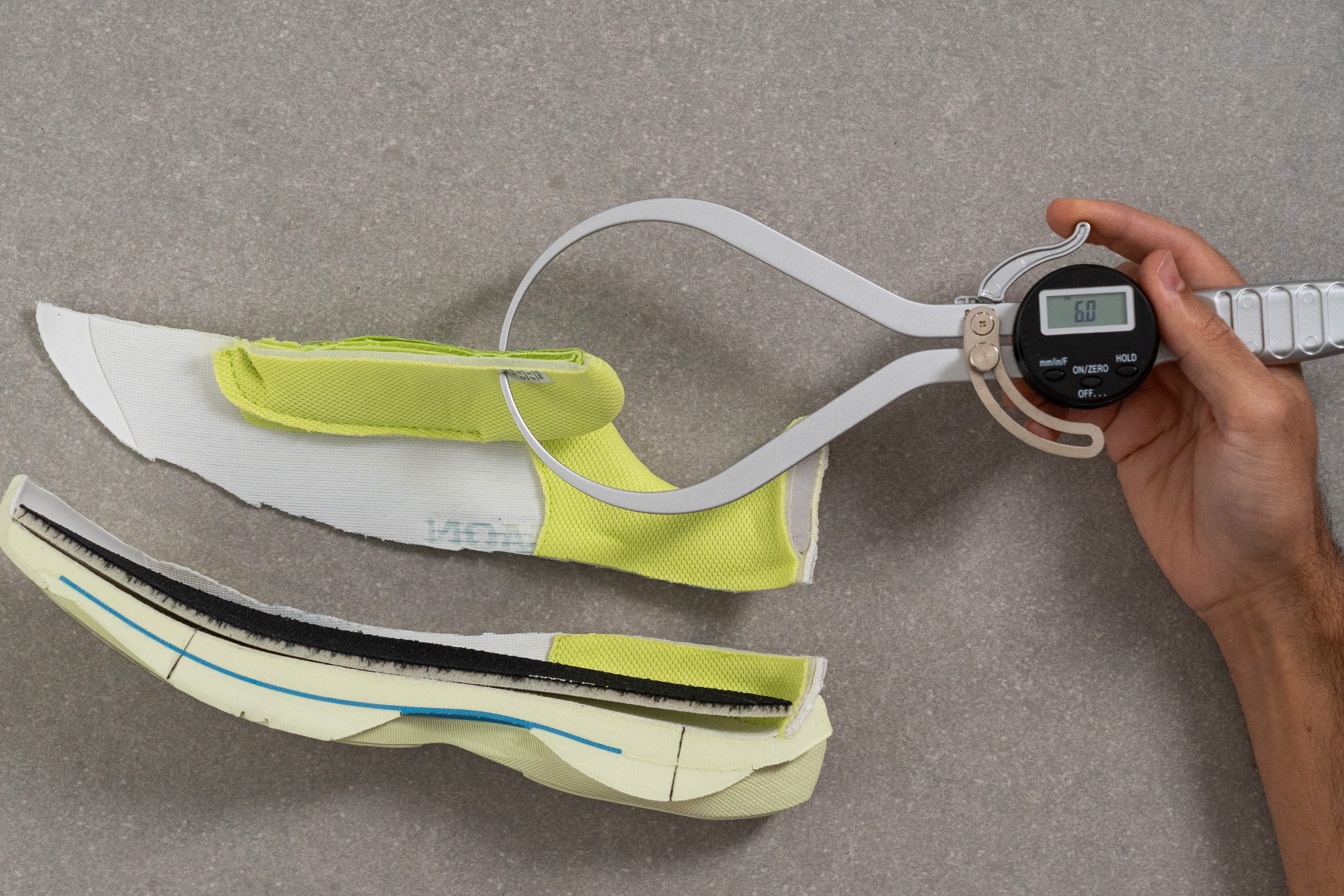
| Spectur 2 | 6.0 mm |
| Average | 5.7 mm |
Tongue: gusset type
A non-gusseted tongue was a bit of a disappointment, as even a small attachment would have significantly improved the shoe's fit and eliminated tongue shifting.
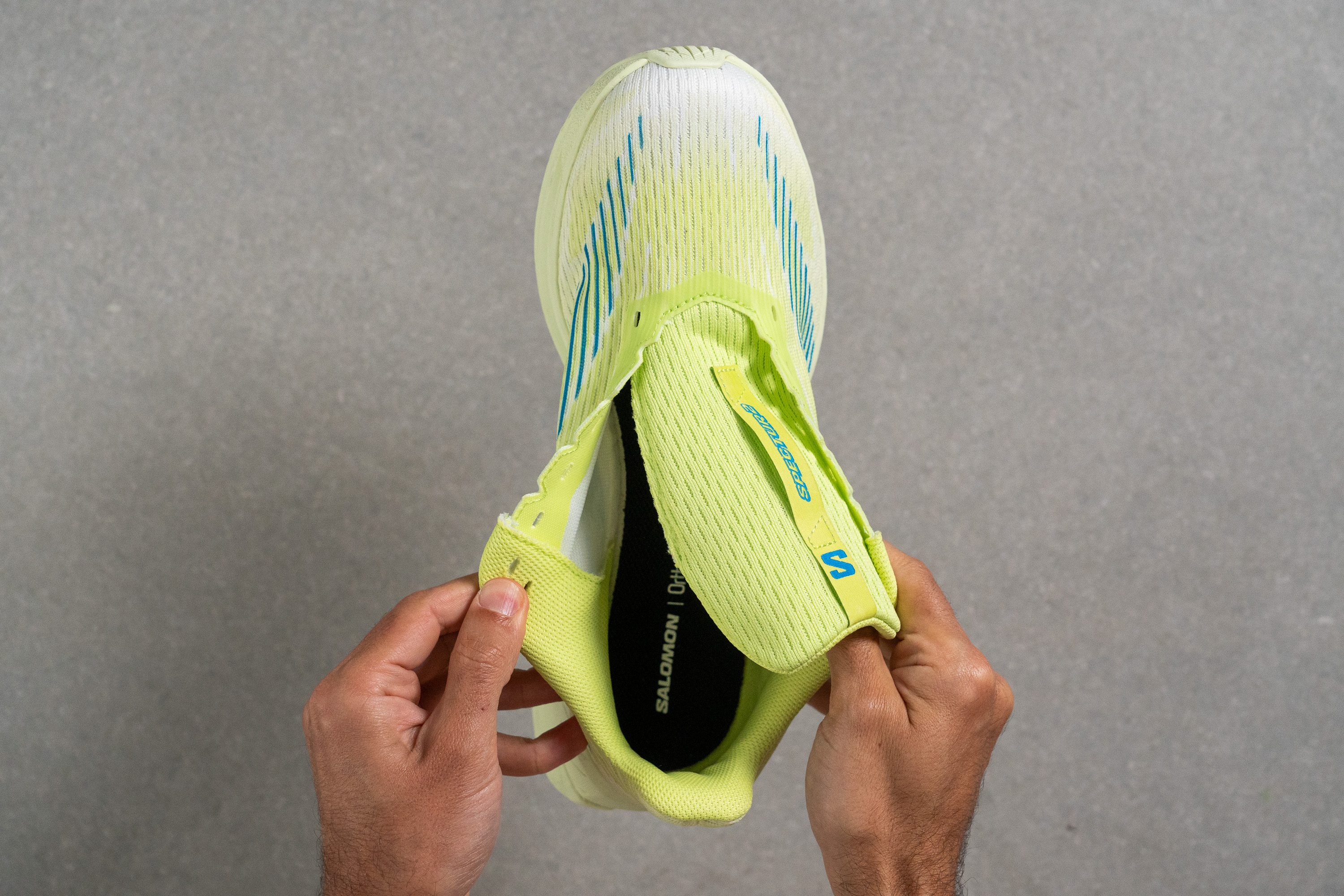
| Spectur 2 | None |
Heel tab
There is no finger loop or pull tab, but you can hold on to the shoe's extended collar when getting it on.
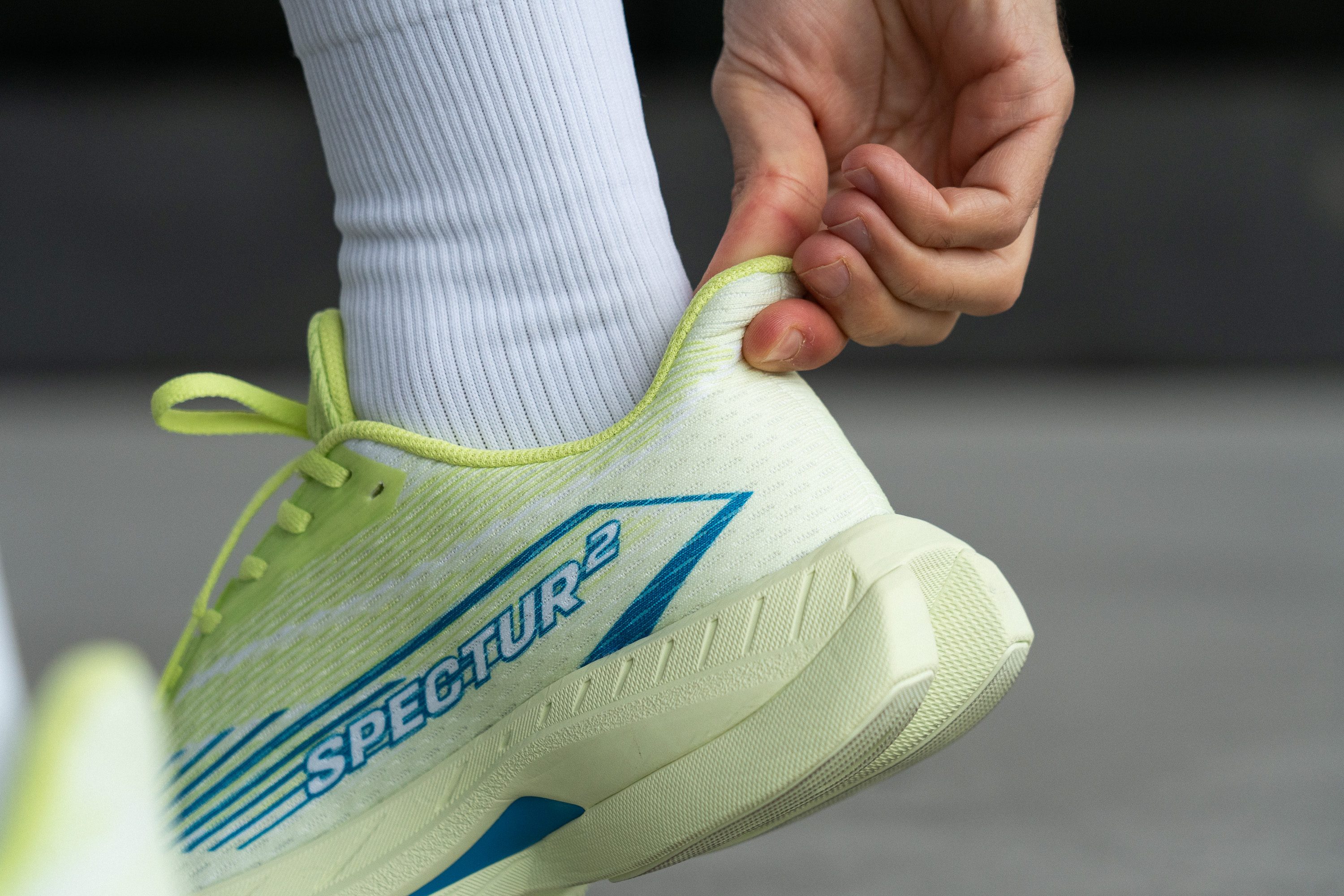
| Spectur 2 | Extended heel collar |
Price
We found the Salomon Spectur 2 to be overpriced compared to its close competition. The same price can get you stellar tempo shoes like the Saucony Endorphin Speed 5 or the PUMA Deviate Nitro 3, which showed significantly better shock absorption and energy return results, among other benefits.

| Spectur 2 | $170 |
| Average | $153 |

